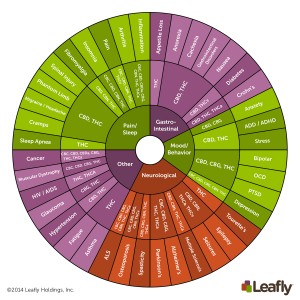I have adopted the absolute worst schedule for my sleep and eating habits, and arriving at college has of course, naturally, taken this concept to a whole new level. What I have always been fascinated with is how this aspect of daily routines changes regular and continual states of the body. However, something I never considered is an already present and natural cause for changes in appetite and energy. I decided to explore this further when I remembered something I saw a few weeks ago about naturally occurring cannabinoids in the human body. A cannabinoid is a class of chemical compounds that interacts with the brain and is structurally related to THC, which is the main active component of marijuana.
Since this is a very new and unexpected idea for me, I had to really give it some thought in relation to its legitimacy and cause. I was aware of the many benefits to health concerns that cannabis, THC, and cannabinoids may have, so I started to believe that since physical ailments can respond well to these substances, perhaps it is because these are found naturally within the body.
A recent article from Inside Science discusses exactly this and promoted a more specific corner of this notion that I began reading more on: We are hungrier, sleepier, and less concentrated around 3 PM. This is due to the natural production of endocannabinoids, which come from cell membranes in the brain, and this cycle peaks around this time of day (Source 1).
The endocannabinoid system changes the physiological processes associated with “mood, memory, appetite and pain-management.”
Another page I read on this topic at Natural News’ website goes further into the fundamental development of children and their mothers, stating that breast milk contains many of the same cannabinoids found in marijuana. This is an introduction to hunger and the importance of eating for children, and otherwise, babies would become malnourished and can even die (Source 2).
This information made it easier for me to acknowledge different contributing factors of my energy and appetite. It’s amazing to break down not only the patterns of the grown body but also why those are directly related to clearly illustrated beginnings with human babies. This is a very odd fact that I had a hard time believing at first, and I now believe I know much less about the human body than I thought, although I have learned something new about it. It makes sense and I also believe that yes, our bodies produce natural effects of a cannabinoid “high.”
Sources:
https://www.insidescience.org/video/why-daily-hunger-peaks-around-3-pm
http://www.naturalnews.com/036526_cannabinoids_breast_milk_THC.html


This is a really fascinating post. When I originally started reading, I anticipated that this would be about our circadian rhythm, which is part of the reason why it’s generally thought that people get tired around the afternoon. However, I did not expect that there’s a possibility that some of the chemicals in marijuana are also connected to this. It seems like relatively new research, though, so I am a bit skeptical about its legitimacy. It seems to me that there are other variables that go into our sleep cycles. For example, this article (http://www.sciencealert.com/chemical-messengers-how-hormones-help-us-sleep) talks about the impact of hormones on sleep. This could be one confounding variable in the connection you’ve posed. There’s also individual things to consider like someone’s chemical make up, diet, exercise routine, and how much sleep they get at night.